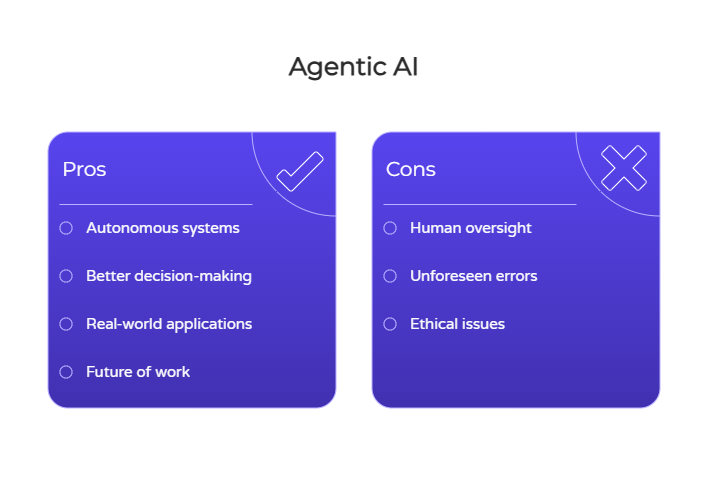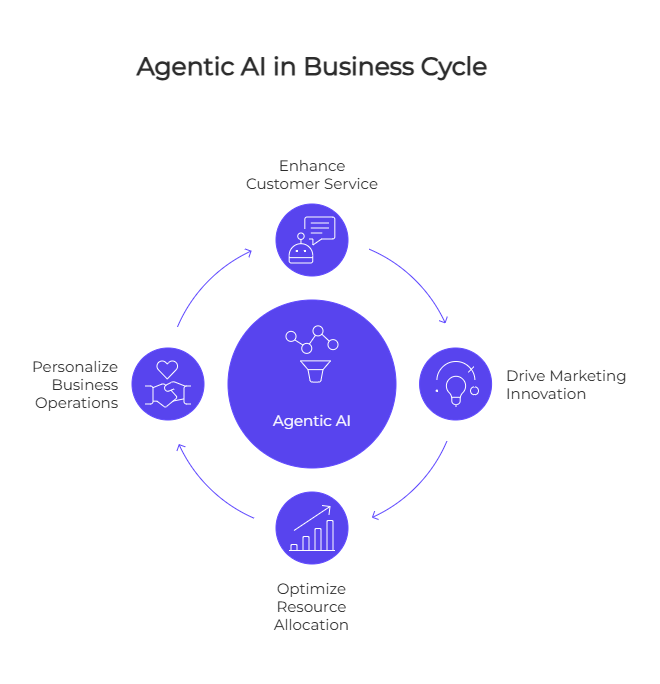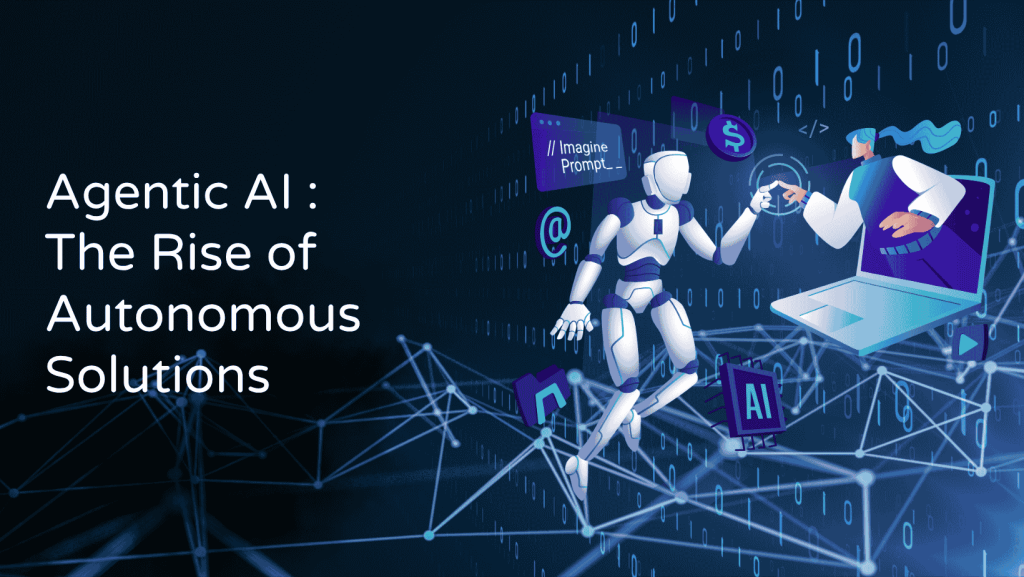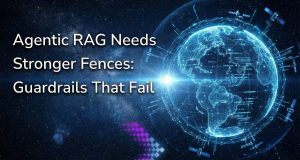Introduction
The era of Agentic AI marks a major shift in how artificial intelligence operates. These systems can make decisions and act with minimal human input. Tools like OpenAI’s AutoGPT and Meta’s CICERO show how agents can solve complex tasks autonomously. But these technologies also raise questions about control, ethics, and oversight.
What is special about these new ai systems is that they might take over jobs that people do. They can help things work better. But there are problems to think about, like what is right or wrong, and what to do when tech breaks down. This blog will talk about what Agentic AI is, where it came from, how we can use it, and how it may shape the future for all of us.
Understanding Agentic AI: Definition and Evolution
Agentic AI is a major breakthrough in the evolution of artificial intelligence. It leverages technologies like deep learning and reinforcement learning to create intelligent systems that act independently. The move from traditional rule-based systems to autonomous multi-agent frameworks allows AI to respond dynamically to real-world complexities. 
From Traditional AI to Autonomous Solutions
Traditional ai systems worked with set rules and settings made by people. These ai systems handled simple jobs well, but they often needed help from people. When something new or not planned happened, they could not change or adjust on their own. For example, old customer support bots could only give answers from a set list. Because of this, these bots were not much help for complex tasks and often called for human intervention.
Agentic ai is not like the way things used to be done before. It helps with automation by adding more intelligence and learning. It also has better contextual awareness. These autonomous systems can do complex tasks by themselves. They watch what is happening, understand what is going on, and then act in real time. This means they solve problems and make choices on their own, even when things get tough or change without notice. This is a big step forward in the world of ai systems.
Now, many businesses can do much more than what they did with traditional ai systems. For example, agentic ai helps with jobs in the supply chain. These autonomous systems can make work smoother, guess what people will want, and change things fast without people having to step in. The move to agentic ai shows how far ai has come. It meets needs for people and businesses that used to be very hard to handle.
Key Characteristics of Agentic AI
Agentic AI is different because it lets its autonomous agents use a few special features. These features help them deal with hard problems on their own.
- Autonomy: These agentic AI systems work on their own. They look at what is going on around them and act without someone always have to step in. They can keep going without much human intervention.
- Goal-Orientation: Agentic AI tries to reach specific goals. It can take a big job and make it into smaller steps. This helps it use each step to get the big job done.
- Context-Awareness: It uses advanced sensory inputs to see and understand what is around it. It answers to what is happening in the moment. This lets it change what it does for every job it faces.
- Learning and Adaptation: By using machine learning and practice in the real world, these systems learn on the job. They get better at what they do as time goes on and with more use.
Agentic AI is like a trusted helper that works with you. In health care, it looks at patient data and uses what it knows to say which treatment is best for each person. Agentic AI works together with people to help us do more at work. It helps make our jobs better and easier, one task at a time.
Core Technologies Powering Agentic AI
Artificial intelligence is changing fast. Agentic AI is a part of this growth. It uses machine learning and neural networks to help AI agents do complex tasks. They can do much of the work with only a little help from people. These agents use data analysis to make better choices.
Deep learning helps them understand natural language at a higher level. With this, you can now talk with them in more ways. They can also work in many areas. These AIs have strong contextual awareness. Autonomous agents can see what is happening and change as needed. Because of this skill, they can find new ways to work faster and get big results.
Machine Learning, Reinforcement Learning, and Beyond
At the heart of agentic AI, you can see machine learning at work. Machine learning helps these systems spot patterns, and this lets them guess what may happen next. They use what they learn to make better choices. You will find agentic AI useful for things like finding fraud, and also for giving better customer service.
Reinforcement learning is a key part of agentic ai. This way, ai agents can make choices as things come up. They try different actions and get rewards when they make the right choices. Because of this, agentic ai agents keep getting better at the jobs they do. For example, self-driving cars use reinforcement learning. This helps them move through traffic in a safe way, even when there are fast changes. New tools like generative ai give agentic ai more ways to help people. With generative ai, agentic ai agents can now be more creative. They make new designs and come up with ideas to use in their work. This helps boost the critical thinking skills of agentic ai agents. When agentic ai systems bring together both new methods and old ways, they work better for many businesses. They help companies fix big problems fast and find smart solutions. These ai systems are now a big part of how we all use ai in our day-to-day lives.
Role of Multi-Agent Systems and Decision-Making Frameworks
Multi-agent systems (MAS) make agentic AI better. In these systems, there are many autonomous agents. They work together as a team to reach big goals. For example, in logistics, a MAS helps delivery drones. The system figures out each drone’s path. It also helps them deal with things that come up quickly. Decision-making frameworks help agentic AI and other AI systems get better. They let these systems handle different situations in the real world. When these systems look at several choices, agentic AI can be more exact. These frameworks also make it easier for them to change when the real world shifts.
Agentic AI can use these tools to solve new problems. It can also use fresh and real-time information to act right away. Many industries can now get better teamwork between people and agentic AI because of this. When MAS is used with strong decision models, these systems can change as the real world changes. They also give better results as things change. This way, work gets done in the best way possible. Agentic AI is often implemented using advanced tools.
👉 Check out AutoGPT on GitHub, one of the most well-known agentic AI implementations.
👉 Explore Meta’s CICERO, an AI agent that collaborates and persuades humans.
Real-World Applications of Agentic AI
The power of agentic ai is now used in many industries. They use agentic ai to help them at work and make things more efficient. In healthcare, ai agents work with patient data. They do data analysis and use this to predict what may happen. This can make diagnosis better and help people get new treatment plans. In finance, these systems check real-time data. They change trading steps and cut down risks in no time. Places with smart tech use autonomous systems to handle resources or the flow of traffic in a good way. All these things show that agentic ai is flexible. It can help solve complex problems without much human intervention.
Transforming Business Operations and Customer Experience
Agentic AI is changing the way people work in businesses. It helps make customer service better. Agentic AI also brings new ideas to marketing campaigns. It can help with daily jobs in the office. A chatbot with agentic AI can talk to customers at any time. It will answer questions fast. This can help customer satisfaction go up. Businesses can get more from agentic AI by using it for data analysis. This system looks at what people do and helps your marketing campaigns reach the right people. With agentic AI, you get insights in real time. This lets companies know how to use their resources in the best way. In the end, agentic ai is about more than just making things work well. It gives your work a personal feel. This can help businesses get ahead and make them stand out from the others. 
Impact on Healthcare, Finance, and Smart Infrastructure
There are many big changes in different fields because of agentic AI. In healthcare, these autonomous systems use advanced sensory inputs to look at patient data. They review the information quickly. This helps doctors and nurses make better choices for figuring out problems and planning treatments. With agentic AI, there is also less human error. In the finance sector, agentic AI makes data analysis better. It can use tools that look at past information to guess outcomes. This makes risk checks faster and easier for people who work in finance. Smart infrastructure uses these technologies to help manage resources well. This helps make traffic move better and saves energy. All these changes show that there is a big shift in the way things work and how good they can be now. This is really a paradigm shift.
Impact Area | Healthcare | Finance | Smart Infrastructure |
|---|---|---|---|
Data Analysis |
Improved patient data review |
Spread HappinessEnhanced data analysis with predictions |
Resource management through data analysis |
Data Analysis |
Improved patient data review |
Spread HappinessEnhanced data analysis with predictions |
Resource management through data analysis |
Challenges and Limitations of Agentic AI
The potential of agentic AI is big. Still, there are some problems and limits to talk about. A main issue is about ethics. There can be bias in the data that agentic AI systems use. This bias can change the way ai systems make choices. Because of this, agentic ai systems can cause unintended consequences in the way they work. There are some issues with adding agentic ai to the systems that people use today. These things can slow down the systems. They can also make it hard for people to use them. There are also security risks. Autonomous systems often work with things like medical records. If these medical records are not kept safe, people can face big problems. Because of this, having constant human oversight is very important. People need to watch agentic ai all the time to make sure it does not make mistakes. This helps keep things safe. When the problem is hard or the steps go outside the normal rules, this need for constant human oversight is even more important.
Ethical Considerations
It can be hard to deal with the ethics of agentic ai. People often run into big problems with these ai systems. Sometimes, ai systems make mistakes because of bias. This can lead to unintended consequences. These problems often show up in places like healthcare or finance. People who use agentic ai must make sure everyone is treated the same way. To do this, there should be clear rules. It also helps to have good ways to manage all the data. The potential of agentic ai is big. But, there are things to watch out for too. Privacy and consent should always be on your mind. This matters a lot when you deal with patient data or any financial info. You need to keep a good balance between new ideas and doing what is right. If the goal is to see agentic ai help people, you have to bring in new ways and also care about trust. Only then will people feel safe and use agentic ai more.
Technical Challenges
Autonomous systems have a lot of technical problems that can slow them down. One big problem is to make the systems work well with old setups. There are many types of data systems. They all get and store information in different ways. This makes the job even harder. It is important to have strong algorithms for data analysis. These must be able to handle information that comes in at any time. A lot of systems now use deep learning and neural networks. These make things work better, but also bring new problems. One worry is bias in the way the algorithms work. This may change how these systems decide things for people. To make sure agentic AI and other autonomous systems can do well in many fields, all these problems need to be solved.
Security Risk
The rise of agentic AI brings new security worries that we need to look at. When people use these autonomous systems in healthcare or finance, they often work with a lot of sensitive data. This can make more problems. If there are not enough strong safety rules, people can get into things like medical records or customer info that they should not have. This puts things like patient confidentiality and money safety at risk. If people trust agentic AI or other autonomous systems too much, even a small human error can become a big issue. Because of this, we need to always check agentic AI and watch autonomous systems. This is to make sure things stay true and safe from any attack. Agentic AI raises serious concerns around safety, fairness, and bias.
👉 Understand AI ethics and bias issues.
👉 Explore the importance of human-in-the-loop systems for AI safety.
Future Trends in Agentic AI
Recent updates in agentic AI show that these ai agents now have more freedom to do tasks on their own. They can solve complex problems and do not always need constant human oversight anymore. When ai agents can work with each other and with people, this helps every sector in new ways. The effect is big for things like healthcare and finance. As neural networks and large language models get better, ai agents can do better data analysis and come up with new ideas in real time. These changes will shape the future of work, and the effect will feel big and new for many people.
Increased Autonomy and Improved Collaboration
Agentic AI is changing a lot of things in many fields. These AI systems often need less help from people. They can do more work on their own. The way autonomous agents and people work together is now more important than ever. When we use both what agentic AI systems can do and the critical thinking of people, we can solve complex problems much better. This teamwork helps people make better choices and solve problems faster. Agentic ai makes ai systems work better with contextual awareness and data analysis in real time. Because of this, the way we work in healthcare, finance, and smart infrastructure is changing a lot now.
Enhanced Reasoning Abilities
The development of better thinking in agentic AI is a big step for artificial intelligence. Today, ai agents use neural networks and deep learning to help with complex tasks. This gives them more contextual awareness. It is something that only people used to have. Now, with new information and data from many sources, these agents can take on work like scientific research and making choices in medicine. Better reasoning in agentic ai helps work go faster and lowers human error. Because of this, people can get more done with artificial intelligence when taking on different jobs.
Conclusion
The story of agentic ai shows how much the world of autonomous systems has changed the way we use technology. Today, these ai agents keep getting better. They can take on complex problems and do not always need people to step in. But as we move ahead with this, it is key to make sure there are good rules for ethics and strong security. The future of agentic ai seems good. It will help in many new ways, across a lot of fields. When organizations see this as a big paradigm shift and start to use ai agents, they get to do things in new ways. This change speeds up their work and helps people come up with new ideas. Want to bring Agentic AI into your business workflow?
Contact our AI team to learn how we can help.



